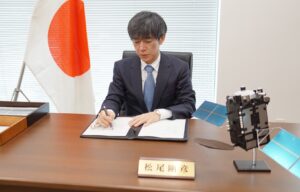Space Command headquarters at Peterson Air Force Base, Colorado.
U.S. Space Command has been working with Japan for some time on space situational data sharing agreements, missile warning data sharing and through multinational space events. In December the U.S. Space Force and Japan’s Office of National Space Policy agreed to launch two U.S. payloads on Japan’s Quasi-Zenith Satellite System, a constellation used for regional navigation.
The Space Force’s Space and Missile Systems Center is developing two optical sensor payloads that are scheduled to launch from Japan’s Tanegashima Space Center in 2023 and 2024.
“While we have had a strong working relationship with our Japanese counterparts for decades, this arrangement codifies the relationship by placing a Japanese liaison officer directly into the conversations we are having on space operations,” said U.S. Navy Rear Adm. Michael Bernacchi, Space Command’s director of strategy, plans and policy.
Maj. Gen. Yajima Masahito, head of the air staff at Japan Air Self-Defense Force headquarters, said: “We cannot secure stable use of space by unilateral effort, therefore, it is essential to cooperate with the U.S. and our partners at all stages from peaceful time to armed contingencies.”



